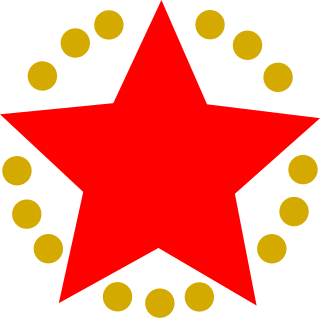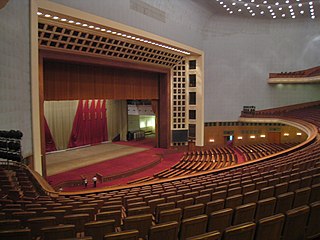
The Central Military Commission (CMC) is the highest national defense organization in the People's Republic of China, which heads the People's Liberation Army (PLA), the People's Armed Police (PAP), and the Militia of China.

The Standing Committee of the National People's Congress (NPCSC) is the permanent body of the National People's Congress (NPC), the national legislature of the People's Republic of China. It exercises the powers of the NPC when it is not in session.
The orders of precedence in China is the ranking of political leaders in China for the purposes of event protocol and to arrange the ordering of names in official news bulletins, both written and televised. It is also sometimes used to assess perceived level of political power. Although there is no formally published ranking, there is usually an established convention and protocol, and the relative positions of Chinese political figures can usually be deduced from the order in meetings and especially by the time and order in which figures are covered by the official media. Since 1982, the General Secretary of the Chinese Communist Party has been the highest-ranking official in the People's Republic of China (PRC).

The 16th National Congress of the Chinese Communist Party was held in Beijing between November 8 and 14, 2002. It was preceded by the 15th National Congress and was succeeded by the 17th National Congress. 2,114 delegates and 40 specially invited delegates represented the party's estimated 66 million members.

The Supreme People's Assembly is the legislature of North Korea. It is ostensibly the highest organ of state power and the only branch of government in North Korea, with all state organs subservient to it under the principle of unified power. However, in practice it is a rubber stamp legislature which exists to approve decisions made by the ruling party as a formality, and which has little to no real power of its own.

The government of the People's Republic of China is based on a system of people's congress within the parameters of a unitary communist state, in which the ruling Chinese Communist Party (CCP) enacts its policies through people's congresses. This system is based on the principle of unified state power, in which the legislature, the National People's Congress (NPC), is constitutionally enshrined as "the highest state organ of power." As China's political system has no separation of powers, there is only one branch of government which is represented by the legislature. The CCP through the NPC enacts unified leadership, which requires that all state organs, from the Supreme People's Court to the President of the People's Republic of China, are elected by, answerable to, and have no separate powers than those granted to them by the NPC. By law, all elections at all levels must adhere to the leadership of the CCP. The CCP controls appointments in all state bodies through a two-thirds majority in the NPC. The remaining seats are held by nominally independent delegates and eight minor political parties, which are non-oppositional and support the CCP. All government bodies and state-owned enterprises have internal CCP committees that lead the decision-making in these institutions.

The vice president of the People's Republic of China, commonly called the vice president of China, is the deputy to the president of the People's Republic of China, the state representative of China.

The 17th National Congress of the Chinese Communist Party was held in Beijing, China, at the Great Hall of the People from 15 to 21 October 2007. Congress marked a significant shift in the political direction of the country as CCP General Secretary Hu Jintao solidified his position of leadership. Hu's signature policy doctrine, the Scientific Development Concept, which aimed to create a "Socialist Harmonious Society" through egalitarian wealth distribution and concern for the country's less well-off, was enshrined into the Party Constitution. It was succeeded by the 18th National Congress of the Chinese Communist Party.

The 8th National People's Congress (NPC) was in session from 1993 to 1998. It succeeded the 7th National People's Congress. It held five sessions in this period.

The 6th National People's Congress (NPC) was in session from 1983 to 1988. It held five sessions in this period.

The 5th National People's Congress (NPC) was in session from 1978 to 1983. It succeeded the 4th National People's Congress. It held five plenary sessions in this period.

The 4th National People's Congress (NPC) was in session from 1975 to 1978. It held only one session, in January 1975, despite the Constitution mandating a session be held each year. There were 2864 deputies to this Congress.

The 2nd National People's Congress (NPC) was in session from 1959 to 1964. It held four sessions in this period.

The 1st National People's Congress (NPC) was in session from 1954 to 1959. It held four sessions in this period. There were 1,226 deputies to the Congress. These were the first legislative elections to take place after the founding of the People's Republic of China.
The Constitutional history of the People's Republic of China describes the evolution of its Constitutional system. The first Constitution of the People's Republic of China was promulgated in 1954. After two intervening versions enacted in 1975 and 1978, the current Constitution was promulgated in 1982. There were significant differences between each of these versions, and the 1982 Constitution has subsequently been amended several times. In addition, changing Constitutional conventions have led to significant changes in the structure of the Chinese government in the absence of changes in the text of the Constitution.

The chairman of the Standing Committee of the National People's Congress is the presiding officer of the Standing Committee of the National People's Congress (NPCSC), which is the permanent body of the National People's Congress (NPC), the national legislature of China.

The National People's Congress (NPC) is the highest organ of state power of the People's Republic of China. The NPC is the only branch of government in China, and per the principle of unified power, all state organs from the State Council to the Supreme People's Court (SPC) are subservient to it. With 2,977 members in 2023, it is the largest legislative body in the world. The NPC is elected for a term of five years. It holds annual sessions every spring, usually lasting from 10 to 14 days, in the Great Hall of the People on the west side of Tiananmen Square in Beijing.

The President of the People's Republic of China, commonly called the President of China, is the state representative of the People's Republic of China, which on its own is a ceremonial office and has no real power in China's political system. However, since 1993, the post has been held by the general secretary of the Chinese Communist Party (CCP) and chairman of the Central Military Commission, who is China's de facto leader.

The 2018 National People's Congress, or the First Session of the 13th National People's Congress, was held in March 2018 at the Great Hall of the People in Beijing, China. The session opened on 5 March and concluded on 20 March. Major state positions were elected in this session.
The 2023 National People's Congress, officially the First Session of the 14th National People's Congress, was held in March 2023 at the Great Hall of the People in Beijing, China. The session opened on 5 March and concluded on 13 March. Major state positions of China were elected in this session.








